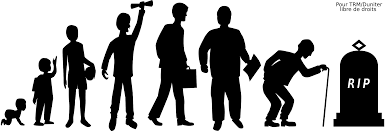Fear
Is It Possible to Ease the Fear of Death? 9 Tactics to Help
Psychology can aid us in navigating the tricky passages of both life and death.
Updated November 1, 2023 Reviewed by Ekua Hagan

Accepting the Reality of Death
How did you react when you first discovered you would someday die?
I can well remember my outrage—yes, outrage—when I learned at the age of 5 or so that my life was not going to last forever. Here I was, just realizing who I was and rejoicing in my newly discovered self, only to find out that I was already on the road to oblivion.
My father comforted me with the words that many parents no doubt use: "You won't have to worry about that for a long, long time."
Although I can remember feeling slightly mollified by his comment, there was a part of my younger self that could not be comforted. Death would indeed come for me someday. Still, I got my father's message. Yes, maybe I could put death off for a long, long time.
I'm now in middle-old age and continuing to use the defense of denial. "I could have 20 more good years," I tell myself. "I won't have to worry for a long, long time." Still, at my age, I think I need a bigger boat of strategies.
What are the most helpful ways to cope with the reality of death? As pointed out here by PT blogger Susan Perry, those who believe in an afterlife have a built-in buffer against the fear of death. But for the rest of us, are there any ways that psychology can help lessen the dread of our own death?* The following nine methods may be helpful.
1. Use the fear of death as motivation to lengthen your life by practicing healthy habits.
Exercise. Healthy eating. Enough sleep. Good relationships. Being in nature. Taking breaks. Flossing. All these healthy habits contribute to a longer, healthier life and to a happier one, too, according to an ever-increasing body of research.
In addition, healthy habits increase the odds that you will avoid the worst ravages of aging and even keep some spring in your step until the end. Have a goal to make your "healthspan" as long as your lifespan!
2. Get older and become less fearful.
When I was in my mid-50s, I had another talk with my parents about death. My father said, "Now that we are older, we are less afraid of dying." And my mother nodded in agreement. I regret that I cannot remember the rest of our conversation. Why was he less afraid? Why did they bring it up? I'll never know, thanks to my anxiety about discussing the subject.
But now that I am older, I do fear death less myself. Psychologists tell us that prolonged exposure to something—even to the idea of death—helps us adapt to it. A friend's mother put it this way: "If you have an elephant in your living room, you eventually get used to it."
The battle against the aches and pains of daily living also takes its toll. As author Mary Roach says, "I don't fear death so much as I fear its prologues: loneliness, decrepitude, pain, debilitation, depression, senility. After a few years of those, I imagine death presents like a holiday at the beach."
To ease the fear of death, just get older.
3. Open up to gratitude.
I would like to believe that my father and mother had also enjoyed such a good life that they were ready to let it go, like guests who have feasted at the Thanksgiving table, realize they are satisfied, and need no more. Maybe they felt like Leonardo da Vinci, who said: "As a well-spent day brings happy sleep, so a life well spent brings happy death."
Focusing on the positive events and people in your life can help you replace fearfulness with gratitude. The gratitude attitude, moreover, brings countless benefits to those who cultivate it. Research tells us that gratitude is closely related to happiness, a sense of purpose, and reduced stress. The famous "Three Good Things" exercise and related activities have an amazing effect on happiness, even when practiced for a short period of time, as I explain in light-hearted fashion here.
4. Create a legacy.
By "legacy," I mean several things. First, there is the priceless legacy of preparing a will and other related documents. Yes, it's tedious. But by specifying exactly who should get what, you can do your part to avoid wounding fights within the family that leave undying hard feelings (pun intended).
By "legacy," I also mean the actions, words, and deeds that you leave behind after you die. The memories others have of you are a type of life extension. That means that if you need to apologize to certain people or to express your love and gratitude to certain others, now is the time to do it.
Finally, you might consider giving the gift of death cleaning as part of your legacy. Yes, I did say "death cleaning," a Swedish custom that I have adopted. Death cleaning involves cleaning up after yourself before you leave this Earth—organizing, sorting, tossing, or giving away your possessions and keepsakes. Without consciously engaging in "death cleaning," I've noticed that many older people are preoccupied with cleaning their basements or attics. I think they are instinctively doing one last favor for their children by making life—and death—a little easier for them.
Once you have prepared your legacy, the sound of the footsteps of death may evoke less terror. You are ready.
5. Keep your purpose top of mind.
Psychologist Sonja Lyubomirsky, writing in The Myths of Happiness, cites research supporting the idea that living with a sense of purpose is the best way to cope with the fear of death. As she points out, finding purpose involves actions that link you to something greater than yourself—alleviating the suffering of others, imparting your values to the next generation, creating work of lasting value, or investing in the community, to give just a few examples.
Lyubomirsky suggests this simple process for doing what matters most: "...Take at least one step each week in the direction that helps you attain purpose in your life and secures your legacy." For help in defining your purpose(s), check out my blog post on this topic.
6. Express your creativity.
Expressing who you are through creative activities is one of the best ways to feel alive, as well as to create a legacy for others. And by "creativity," I do not mean just artistic expression. Everyone has a creative side, whether they express it through woodworking, leadership, public speaking, establishing a business or charity, educating children, or almost any human endeavor. Anything you have made—including pottery, photo albums, letters, books, videos, blogs, fabric arts, paintings, or records of other professional accomplishments—can become precious mementos for your children and grandchildren.
7. Let the knowledge of death help you appreciate the sweetness of life.
Scottish essayist Alexander Smith wrote in 1863 that, "It is from some obscure recognition of the fact of death that life draws its final sweetness."
In fact, since turning 65, I have experienced strange moments of transcendent happiness. Perhaps Mother Nature provides these moments to all creatures in autumn, as we go about gathering nectar in the final stages of life.
Whether or not that is true, we can choose to be mindful of the small things in life that bring pleasure and happiness. A good cup of coffee, a beautiful view, a robin in the yard—anyone can decide to become a master at noting and appreciating the tiny joys of life. This skill may even help you live longer. The Japanese elders of Okinawa who practice the art of ikigai, which includes noticing small pleasures as well as having a purpose, are the longest-lived people on Earth. Such art will also bring you into the present moment, freeing you from past regrets or future worries.
8. Find social support and talk about your anxieties.
Reading between the lines of this blog post, you can discern that discussing the subject of death with my parents, however awkward, nonetheless gave me permission to think about it, write about it, and begin to accept it. Talking to family members, therapists, or friends could serve the same purpose. "Death Cafes" have sprung up all over the world with the goal of presenting programs that help people talk about and prepare for death.
In general, social support—knowing that others care about you and have your back—can insulate you from all manner of ills as well as promote longevity, health, and happiness, according to research cited by Lyubomirsky. She describes emotionally supportive relationships as "the single best way to prepare for a future fateful diagnosis or any kind of tragedy or crisis."
9. Indulge in a little death humor.
Death wins in the end, but at least we can poke fun at it along the way. Even cornball jokes can help. That reminds me—do you know why life is like a roll of toilet paper? Because the closer you get to the end, the faster it goes.
Final Thoughts
When it's time for me to go, I hope I am able to use these techniques to ease my end-of-life fear or at least make the fact of death a little more bearable. I hope this post has given you some comforting and useful ideas, too. Perhaps at some point, you might agree with the Harry Potter character who said, "After all, to the well-organized mind, death is but the next great adventure." I'm not sure I could adopt that point of view, but I can relate to this wise saying from the Buddha: "Even death is not to be feared by one who has lived wisely."
In other words, to lessen your fear of death, live a good life.
© Meg Selig, 2020. For permission, contact me here.
*Note that I am limiting this blog post to facing one's own death in the fullness of time. Early deaths, deaths of beloved others, and especially deaths of children and young people present special challenges and hardships. Also, if you are experiencing suicidal thoughts and/or depression, contact a mental health professional or call 988, the National Suicide and Crisis Lifeline number, for resources.
To find a therapist, please visit the Psychology Today Therapy Directory.
References
Lyubomirsky, S. (2013) The Myths of Happiness. (NY: Penguin Books), p. 205 ff.
Perry, S. “You’re Going to Die: Three Ways to Lessen Your Dread,” psychologytoday.com.
Solomon, S., Greenberg, J., and Pyszczynski,T. (2015). The Worm at the Core: On the Role of Death in Life. NY: Random House. p. 210 ff.




